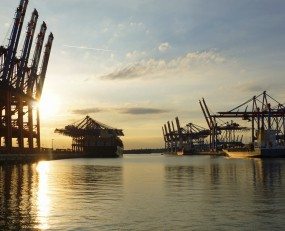
The past few months have seen an aggressive rationalisation of the ship building sector in East Asia. A series of planned mergers in China and South Korea over the past few weeks suggests a large concentration in the production of merchant ships of most kinds.
Hyundai Heavy Industries and Daewoo Shipbuilding & Marine Engineering have announced the intention to merge into one organisation, the precise nature of which is uncertain and which may effectively be a takeover of Daewoo by Hyundai Heavy. This new company would dominate Korean ship-building and would be the largest shipbuilder the world. In South Korea, the nearest remaining builder would be Samsung Heavy, but it is just a fraction of the size.
Yet China promises even greater consolidation of its ship building sector. Its two largest yards, China CSSC Holdings Ltd and China Shipbuilding Industry Corp, last month applied to merge and now there are rumours that China’s next four largest shipbuilders will also merge with each other. If this rationalisation comes to pass then the building of container ships, tankers, bulkers and LNG carriers will be dominated by just two or three companies. The two largest will hold around half of all orders at present.
There are some possible hurdles, with the tensions between the Japanese and Korean governments delaying the approval by competition authorities of the Hyundai-Daewoo merger. However, such is political momentum behind these deals that this is unlikely to halt the drive to rationalisation in South Korea entirely. The South Korean ship building sector has been economically troubled for a number of years and the Korean state investment banks are keen for a solution to a problematic but politically sensitive industry. That said, such merger activity is a significant challenge to Japan’s own ship building sector which now looks small and fragmented.
The implications for ship owners and operators are likely to be significant. A consolidated ship supply base is likely to have much better pricing power. Indeed, there is already talk of increases in ship prices of between 5-10% in the short term. This could add substantially to the cost base of the container shipping sector.
Source: Transport Intelligence, August 6, 2019
Author: Thomas Cullen